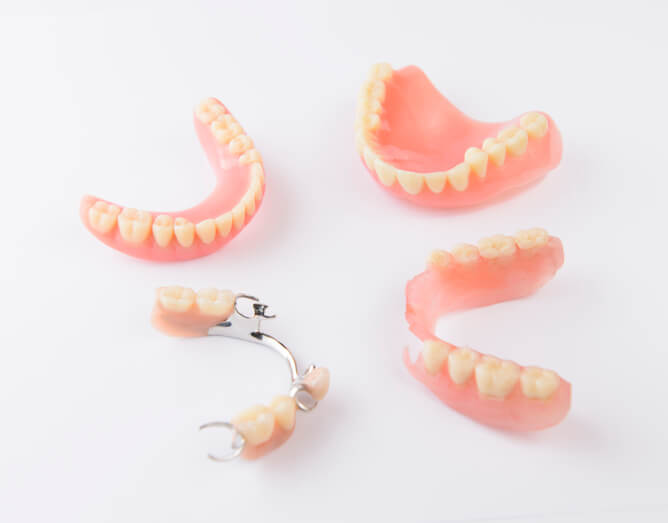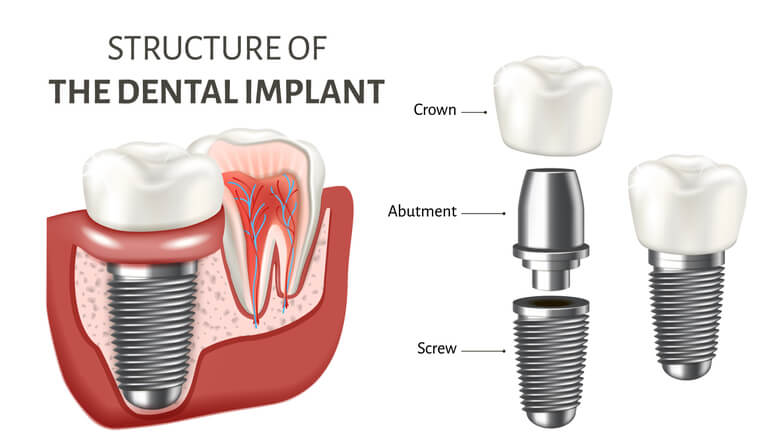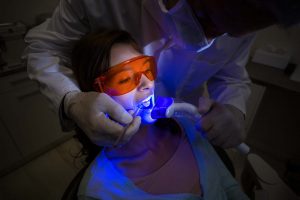Do you have missing teeth? According to a report by the Canadian Health Measures Survey, about 6.5 % of don’t have any of their natural teeth, and a significant number have at least one missing tooth. Obviously, those without any natural teeth will seek out alternatives like dentures or dental implants. However, it is also important to replace missing teeth, even a single missing tooth, whether it is visible or not when you are smiling or talking, so you can avoid a number of oral health issues.
3 Common Causes of Tooth Loss
Gum Disease
The most common tooth loss is gum disease. If you do not practice proper oral hygiene or fail to maintain your bi-annual dental checkups and cleanings, harmful bacteria can accumulate on the surface of your teeth, causing inflammation in your gums. Eventually, advanced gum disease called periodontitis can cause bone loss around your teeth which can lead to tooth loss.
Tooth Decay
Tooth decay and cavities are caused by bacterial infection. If you ignore tooth decay, it can destroy the pulp in the center of your tooth. Your dentist will try to save your tooth through root canal treatment but if the decay is severe, it may be necessary to extract the tooth.
Injury
Another common cause of tooth loss is trauma caused by certain activities like sports, or accidents. That’s why it’s important to adhere to safety rules (e.g. use mouth guards and always wear your car seatbelt) and be more vigilant. It’s also important to remember that you shouldn’t use your teeth to remove bottle caps, tops, or lids, to loosen knots, tear off tags or cut thread since these actions can loosen your teeth or even cause tooth loss. What’s more, you should avoid chewing hard objects like ice, or trying to crack nut shells to avoid damaging your teeth.
Problems Resulting from Missing Teeth
As we have mentioned in the opening, even if you fail to replace your missing teeth with dentures or dental implants, you will harm both your oral and overall health. Here are some of the most common problems that can result from not replacing your missing teeth:
Poor Oral Health
When you lose a tooth the tooth/teeth next to it also lose their support. So, if the lost tooth isn’t replaced, the teeth next to will move toward the empty space. Consequently, these teeth can become crooked which will make them more difficult for you to brush and floss properly as well as unattractive. Keep in mind that teeth that are not cared for properly can suffer from dental decay and gum disease.
Lower Self-Confidence
Losing a permanent tooth does not only affect our health but also our self-confidence and self-esteem. When people do not replace missing teeth, they tend to avoid smiling or even talking because they feel self-conscious. This can affect both their social life and career.
Jawbone Loss
One of the most serious issues that develop after the loss of a tooth is the deterioration of the jawbone. This occurs because your tooth roots stimulate your jawbone and keep it healthy from the pressure of chewing. When this stimulation is lost due to the extraction of your tooth, the bone is reabsorbed into your body. In fact, during the first year after losing a tooth, 25% of the bone is lost and the loss continues over time. Furthermore, the gap formed after the loss of a tooth can act as a food and bacteria trap which can result in gum disease.
Another result of jawbone loss is facial sagging. This occurs because the lower third of the face starts to collapse and gradually the distance between the tip of the nose and the chin is reduced. This condition causes noticeable wrinkling around the mouth. The lips also begin to thin and the chin becomes more pointed. Consequently, your facial appearance can age prematurely if you do not replace missing teeth immediately.
Negative Effects on Your Diet
If you don’t have all your teeth, chewing and digesting your food properly can become an issue. This applies especially to foods like fruit, vegetables, meat, nuts, and whole grains. These foods are part of a healthy diet, therefore without processing them properly, we may lose their nutritional value. As a result, replacing any of your missing teeth is important since it can help you process your food properly and stay healthy.
Negative Effects on Speach
Another issue that may arise if you have missing teeth is the ability to speak or make certain sounds that are necessary to pronounce words correctly. Our teeth are needed to help us produce fricative and affricate sounds like /s/, /z/, /f/, /v/, /th/, /sh/, /ch/, and /j/. By being unable to produce these sounds verbal communication can become difficult for you and the people listening to you.
Solutions for Missing Teeth
There are several solutions for replacing your missing or badly decaying teeth. Which solution is best for you may depend on the state of your oral and general health as well as your budget.
Dentures, Partial Dentures, or Dental Bridges
Removable partial dentures, or bridges, are attached to the teeth to fill in gaps where other teeth are missing.

Dental Bridges
Dental bridges can help you keep your remaining teeth from drifting out of position. You can also reduce your risk of gum disease, help correct bite issues, and improve speech with a dental bridge. The dental bridge, made of a grouping of interconnected crowns, is designed to fit your mouth, replacing the missing teeth while supporting those that remain. It is held in place by two crowns.
Dentures
Dentures are a type of prosthesis that can be used to accommodate multiple-missing teeth. They are typically removable, but some are bonded or implanted. When all your teeth are have been lost or need to be removed due to severe decay, complete dentures are used. When only some teeth are missing, partial dentures are used. Complete dentures replace an entire arch. Following a few months of total tooth loss, conventional dentures are placed in the patient’s mouth. This is done to allow the gums a chance to heal.

Dental Implants
If you have missing or decaying teeth that need to be removed, then dental implants can be the ideal solution for you. Anyone with a fully developed jaw, which usually happens in early adulthood, and with healthy gums and jaw bones can be a candidate for a dental implant. In fact, for the majority of adults with a fully-developed jaw, dental implant procedures can be successful in their 80s or even 90s. If you have no health issues that could affect the success of the procedure and the jawbone is thick enough to support an implant, then there is no upper age limit. Therefore, you don’t need to worry about age, so much as your overall oral health.
Dental implants have a number of very important benefits that are related to your oral/physical health as well as your quality of life. For example,
🦷️ prevent bone loss by stimulating the jawbone;
🦷️ function just like your natural teeth;
🦷️ improve your self-confidence;
🦷️ they offer hassle-free maintenance; and
🦷️ with proper care, they can last a lifetime.
Book Your Tooth Replacement Consultation
If you would like more information about teeth replacement options like dental implants or dentures, contact Langley Dental Centre. Our dentists will help you find the solution that’s suitable for you.
Book your consultation with our Langley dentists at Langley Dental Centre at 200 Street and 86 Avenue. During your consultation, you can also have a complete oral examination to determine if dental implants are right for you. Call us at 604-455-6247 or contact us online.






